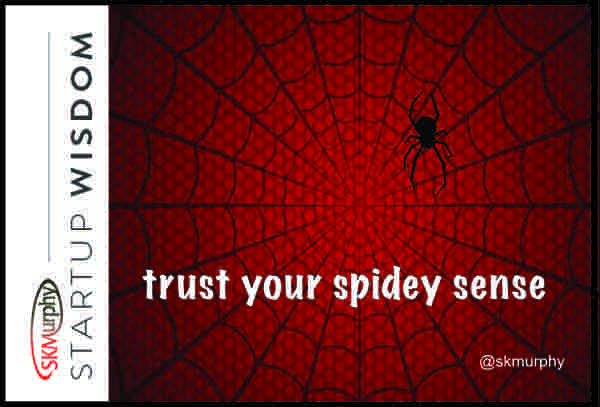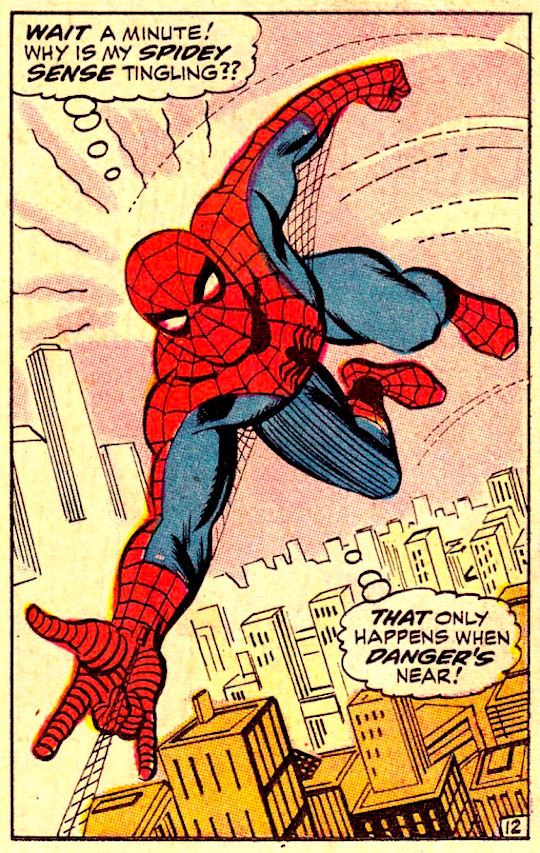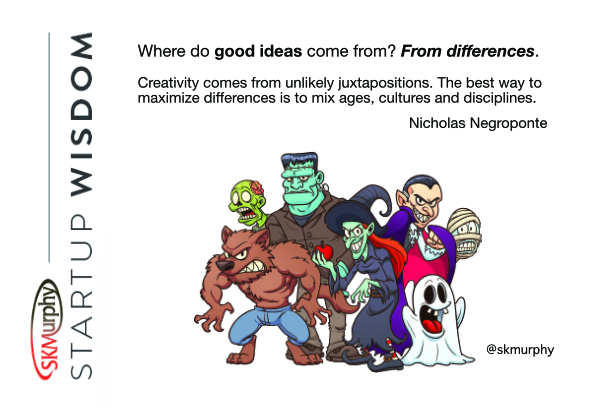My October 2019 collection of quotes for entrepreneurs has a focus on intuition and the unconscious recognition of risk and danger that surfaces as sudden anxiety when your “spidey sense is tingling.”
Quotes For Entrepreneurs Collected in October 2019
 My focus this month is on different modes of thinking, in particular intuition and premonitions. It’s important to pay attention when your “spidey sense is tingling.” This is different from a vague unfocused anxiety but a sudden onset of heightened focus and awareness where you intuition has become aware of specific risk and is trying to get your conscious attention. I collect these quotes for entrepreneurs from a variety of sources and tweet them on @skmurphy about once a day where you can get them hot off the mojo wire. At the end of each month I curate them in a blog post that adds commentary and may contain a longer passage from the same source for context. Please enter your E-mail address if you would like to have new blog posts sent to you.
My focus this month is on different modes of thinking, in particular intuition and premonitions. It’s important to pay attention when your “spidey sense is tingling.” This is different from a vague unfocused anxiety but a sudden onset of heightened focus and awareness where you intuition has become aware of specific risk and is trying to get your conscious attention. I collect these quotes for entrepreneurs from a variety of sources and tweet them on @skmurphy about once a day where you can get them hot off the mojo wire. At the end of each month I curate them in a blog post that adds commentary and may contain a longer passage from the same source for context. Please enter your E-mail address if you would like to have new blog posts sent to you.
+ + +
“Supposedly your hair stands on end in the instant before you get struck by lightning. I had a similar sensation that afternoon on the highway. I recognized the tingle as a premonition but a useless one: no specific details, only the feeling.”
Rich in Love by Josephine Humphries
The tingle says, “pay attention: something is out of the ordinary and could be trouble.” Of course it’s more useful when you get an actual insight, an intuition as to a specific threat and how to counter it or a resolution to a question that has been troubling you, where multiple pieces fit together in a configuration that makes sense. This is also different from a “Constructive Pessimism” approach where you consciously stress your plan of action for potential pitfalls.
+ + +
“Never chase happiness, love, passion and success. Those things will catch you when you start chasing opportunities to make a difference in people’s lives.”
Alexander Den Heijer
Entrepreneurs who focus on serving others and providing value do better than those who chase dollars. Aside from some visible outliers who are high function sociopaths.
+ + +

“Those who have the largest horizon of thought, the most extended vision in regard to the relation of things, are not remarkable for self-reliance and ready judgment. A man who sees limitedly and clearly, is more sure of himself, and more direct in his dealings with circumstances and with others, than a man whose many-sided capacity embraces an immense extent of objects and objections,—just as, they say, a horse with blinkers more surely chooses his path, and is less likely to shy.”
Anna Jameson in “A Commonplace Book: Thoughts, Memories, Fancies” (1855)
An earlier exposition of what John Cleese called “open” vs. “closed” thinking in his creativity lecture.
“People function at work in terms of two modes: open and closed.
By the “closed mode” I mean the mode that we are in most of the time when {we are} at work. We have inside us a feeling that there’s lots to be done and we have to get on with it if we’re going to get through it all. It’s an active (probably slightly anxious) mode, although the anxiety can be exciting and pleasurable. It’s a mode which we’re probably a little impatient, if only with ourselves. It has a little tension in it, not much humor. It’s a mode in which we’re very purposeful, and it’s a mode in which we can get very stressed and even a bit manic, but not creative. Creativity is not possible in the closed mode.
By contrast, the open mode, is relaxed… expansive… less purposeful mode… in which we’re probably more contemplative, more inclined to humor (which always accompanies a wider perspective) and, consequently, more playful. It’s a mood in which curiosity for its own sake can operate because we’re not under pressure to get a specific thing done quickly. We can play, and that is what allows our natural creativity to surface.”
John Cleese “Lecture on Creativity“
+ + +
“Trial and error are the essence of discovery. Your organization should be hospitable to both.”
Donald Rumsfeld in “Rumsfeld’s Rules“
This reminds me of an observation by James Geary that I blogged about in “Ten Aphorisms For Entrepreneurs By James Geary”
“In the margin for error lies all our room for maneuver.”
James Geary in “My Aphorisms“
But it’s your ability to survive mistakes that allows you to learn from them–if you have a mind to. Paradoxically this argues less for a “fail safe” approach that makes extensive investments in avoiding mistakes than for making smaller “safe to fail” or affordable loss bets that are survivable.
+ + +
“Money, like tech, is amoral. If we insist it matters most our own morals will inevitably disappear.”
Ben Thompson’s conclusion to “The China Cultural Clash”+ + +
“Six blind elephants were discussing what men were like. After arguing they decided to find one and determine what it was like by direct experience. The first blind elephant felt the man and declared, ‘Men are flat.’ After the other blind elephants felt the man, they agreed.”
Moral: “We have to remember that what we observe is not nature in itself, but nature exposed to our method of questioning.”
Werner Heisenberg
h/t Wikipedia entry for Blind Men and an Elephant; I used the Heisenberg quote to close “Q: Is Building The Wrong Product A Waste of Time?” I originally curated it in July 2012.
+ + +
Two from Clive James autobiography “Unreliable Memoirs”
“I wanted my mistakes forgotten, not faced up to–the foundation of a bad habit.”
Clive James in “Unreliable Memoirs”“Slowly it began occurring to me that the ability to get things done was a combination of two elements: the desire to do them and the capacity to take pains.”
Clive James in “Unreliable Memoirs”
As far as I am concerned you have just read the best part of the book. When I finished it I was reminded of something we would say as children after we had recounted an experience in a less than clear–much less compelling–fashion: “I guess you ad to be there.”
In high school I learned the natural rejoinder: “No, it’s the way that you tell it.”
I listed another quote by Clive James in “Quotes For Entrepreneurs Collected August 2015,” this had led me to expect more from his memoirs:
“Common sense and a sense of humor are the same thing, moving at different speeds. A sense of humor is just common sense, dancing. Those who lack humor are without judgment and should be trusted with nothing.”
Clive James in “Exploring the Medium” (4-Feb-1979)
+ + +
“The amelioration of the world cannot be achieved by sacrifices made in moments of crisis; it depends on the efforts made and constantly repeated during the humdrum, uninspiring periods, which separate one crisis from another, and of which normal lives mainly consist.”
Aldous Huxley
True also of what is required to pilot a startup to success.
+ + +
“The dogmas of the quiet past are inadequate to the stormy present. The occasion is piled high with difficulty, and we must rise with the occasion. As our case is new, so we must think anew and act anew. We must disenthrall ourselves, and then we shall save our country.”
Abraham Lincoln in Second Annual Message (Dec-1-1862)
+ + +
“Even a stopped clock is right twice every day. After some years, it can boast of a long series of successes.”
Marie Von Ebner-Eschenbach
+ + +
“I do not like the phrase: Never cross a bridge till you come to it. The world is owned by men who cross bridges on their imaginations miles and miles in advance of the procession.”
Bruce Barton
+ + +
“You think that a wall as solid as the earth separates civilization from barbarism. I tell you the division is a thread, a sheet of glass. A touch here, a push there, and you bring back the reign of Saturn.”
John Buchan in “The Power House” (1916)
I curated a longer version of this in Aug-2020
+ + +
“Facebook optimizes for engagement so that their users see more ads of all kinds. All too often that means optimizing for outrage, for polarization, for disingenuous misinformation. Facebook favors the extremes, the conspiracy theorists, the histrionic diatribes on all sides.”
Jon Evans in “Facebook isn’t free speech, it’s algorithmic amplification optimized for outrage” (Oct-20-2019)
I blogged about this in”Superstimulus: Refining Online Interactions into Digital Heroin”
+ + +
False: the best plan wins.
True: the best intelligence wins.
Because: the world moves too fast for plans.Nine Lies About Work by Marcus Buckingham and Ashley Goodall
I think this is half-true: planning is useful when it allows for a range of “facts on the ground” so ongoing reconnaissance and intelligence gathering allows you to better align your efforts with what you want to achieve.
There was a good eight to twelve page magazine article trapped between the covers of this book. The planning vs. monitoring and reacting intelligently is false choice, you need to do both well. The example they sight was the establishment of a central British fighter command to process enemy sightings during the Battle of Britain and vector planes appropriately. To me this highlights the value of coordination and collaboration based on shared situational awareness.
In “Preventing Chaos in a Crisis,” Patrick Lagadec observes: “The past settles its accounts. …the ability to deal with the unexpected is largely dependent on the structures that have been developed before chaos arrives. The complex event can in some ways be considered as an abrupt and brutal audit: at a moment’s notice, everything that was left unprepared becomes a complex problem, and every weakness comes rushing to the forefront.” The best way to mitigate this is to do your homework in advance and work out a range of options. More on this in “Thomas Schelling on Strategic Surprise.”
+ + +
“A pattern I’ve seen in many different fields: even though many people have worked hard in the field, only a small fraction of the space of possibilities has been explored, because they’ve all worked on similar things.
Even the smartest, most imaginative people are surprisingly conservative when deciding what to work on. People who would never dream of being fashionable in any other way get sucked into working on fashionable problems.
Some of the best places of all to find new ideas are fields that people think are played out, because they’ve already been fully explored. […]
The best protection against getting drawn into working on the same things as everyone else may be to genuinely love what you’re doing. Then you’ll continue to work on it even if you make the same mistake as other people and think that it’s too marginal to matter.”
Paul Graham (@paulg)
In “Chase, Chance, and Creativity: The Lucky Art of Novelty” James Austin defines altamirage as a form of luck that stems from your personal interests pursued over a period of time. I think it’s a useful formulation and drives the differentiation you outline.
+ + +
“What did you learn last month that will make you more effective this month?”
James Kouzes
This is a very powerful question to ask yourself and ask at a team level once a month, and once a quarter and once a year as part of a planning process. I learned this at Cisco in the early 90s from a talk by Jim Kouzes, co-author of “Leadership Challenge.” I used this in “Startups Where ‘We Are All In This Together’ Learn Faster.”
+ + +
“If we do not learn from history, we shall be compelled to relive it. True. But if we do not change the future, we shall be compelled to endure it. And that could be worse.”
Alvin Toffler
To learn from the future requires that you not only invest effort in foresight but that act on the insights it offers. As Warren Buffett once observed: “Predicting rain doesn’t count; building arks does.” I blogged about this in “Risk Mitigation: If You Predict Rain Build an Ark”
+ + +
“There’s nothing as safe as ignorance–or as dangerous.”
Rex Stout in “The Squirt and the Monkey“
If you are unconscious of your ignorance–which is all of us to some extent–you feel safer, and perhaps luckier, than events may warrant.
+ + +
“The trick of obscurity is vital to things that vanish in daylight.”
Greg Norminton in “The Lost Art of Losing“
Understanding obscurity is useful when you are scouting markets and don’t want to telegraph your intention. Reverse engineering it is doubly useful for uncovering risks the rest of the team has overlooked.
+ + +
“I like to tell designers that their job isn’t to be storytellers, but to be story-listeners–people who takes the time and energy to listen to others’ stories. That’s the essence of a conversation: people listening to each other.”
John Maeda
From the Foreword to “Conversational Design” by Erika Hall. This is good advice for entrepreneurs too.
+ + +
“We are constrained not by the tiny number of possibilities that we reject,
but by the vast number that never occur to us.”
Aaron Haspel in “Everything“
An entrepreneur’s most important failures are failures of creativity and imagination, choosing from too narrow a range of options. Always ask yourself, “What’s missing?” and “What’s possible that we are not considering?” I think “parallel entrepreneurs”(vs. serial entrepreneurs who pick one idea at a time and pursue it) have too many ideas to choose from, and no clear path to revenue.
+ + +
And finally a serious quote interpreted with a Halloween theme.
“Where do good ideas come from? From differences.
Creativity comes from unlikely juxtapositions. The best way to maximize differences is to mix ages, cultures, and disciplines.
Nicholas Negroponte

